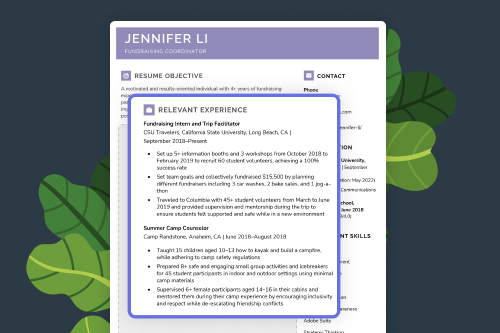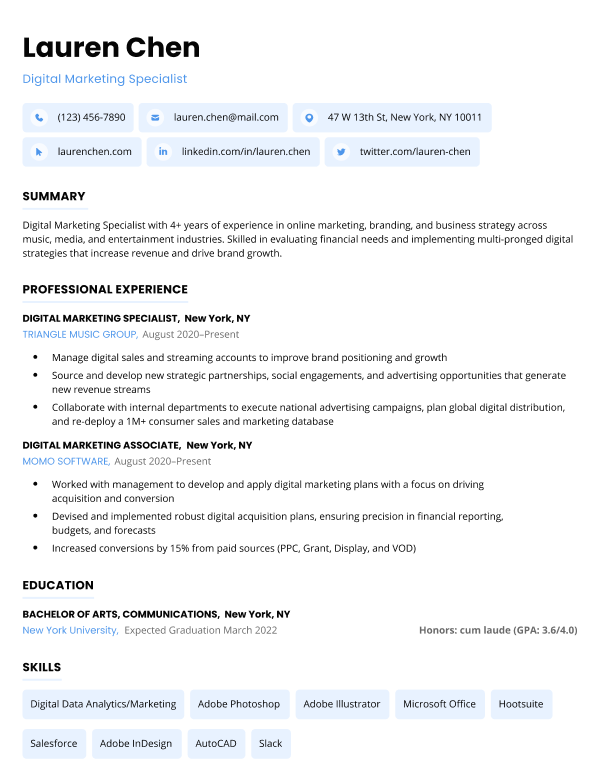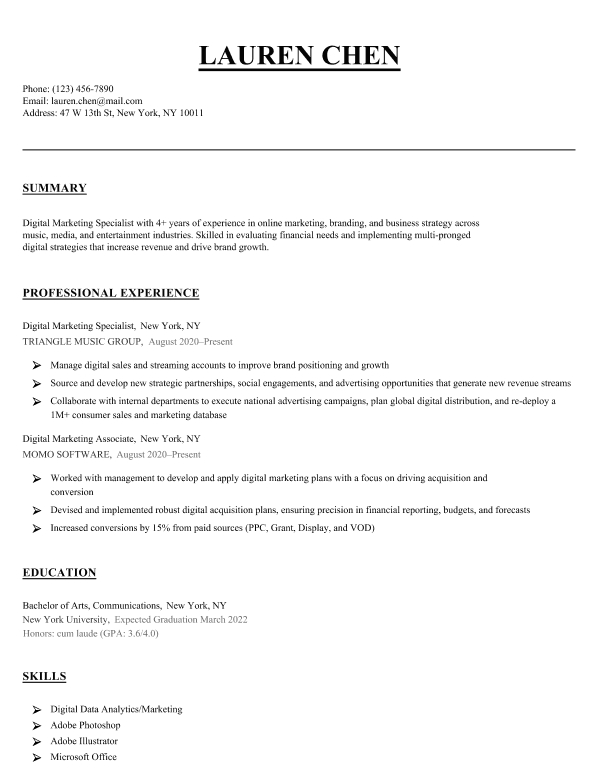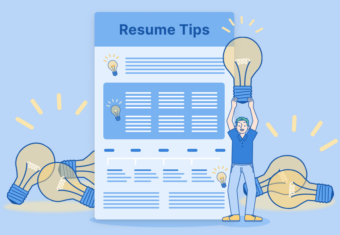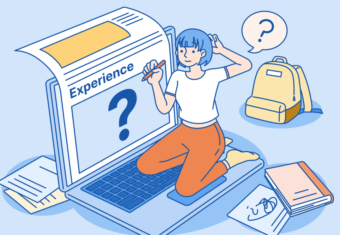Watch our video below to learn six ways to include relevant experience on your resume, brought to you by our career expert Eva:
What is relevant experience?
Relevant experience is any experience that has prepared you to step into the new job you’re applying for.
Companies look for candidates who have knowledge or skills that fit their job descriptions, so including relevant experience on your resume tells employers you’re:
- aware of the job criteria they’re seeking
- qualified for the target role
- easy to train
- capable of handling the work
Our free-to-use resume builder can make you a resume in as little as 5 minutes. Just pick the template you want, and our software will format everything for you.
Employers receive several job applications during busy hiring seasons. That means including relevant experience when making your resume for a job is important because it emphasizes the transferable skills you’ve gained from your previous roles and helps you stand out from other candidates.
Where can I gain relevant experience?
You can gain relevant experience by developing professional work experience through full-time or part-time positions.
Besides your work history, relevant experience can also come from less traditional roles.
Below are other ways to gain relevant experience:
1. Internships
Internships give high school students, recent college graduates, and entry-level candidates a chance to gain short-term work experience at a company.
Paid and unpaid internships on a resume are effective ways to showcase your relevant experience because they:
- provide opportunities to learn more about a company or industry
- give you hands-on experience in the professional world
- teach you several valuable hard and soft skills
And after gaining some work experience and successfully completing your internship, your company can become a work reference or even rehire you for a more permanent role.
2. Volunteer experience
Even though volunteer experience is unpaid, you’ll learn several skills to develop yourself personally and professionally. For instance, volunteering at a kid’s summer camp teaches you valuable hard skills such as event planning and supervising children.
Volunteering also tells employers you’ve gained many soft skills that affect how you interact with your colleagues in professional settings.
These examples are relevant soft skills for the workplace:
- Adaptability
- Communication skills
- Leadership skills
- Management skills
- Organizational skills
- Teamwork
3. Contract or freelance work
Including contract or freelance work on a resume is another way to highlight your relevant work experience for a job and show employers you’ve got the qualifications they’re looking for.
And in addition to sending your resume, you can present employers with a portfolio of your most relevant work as well as recommendations from your previous related jobs.
4. Relevant coursework
Employers know a college education teaches several marketable skills, so mention any coursework that directly applies to your target role.
Including relevant coursework on your resume such as projects, extracurricular activities, or academic achievements communicates that you have the knowledge required for the position, even if you lack professional experience.
5. Hobbies and interests
Adding a relevant hobbies and interests resume section demonstrates to employers you’re a good cultural fit for the team and are passionate about the role or industry you’re applying for.
Just make sure your hobbies and interests are directly applicable to the position or company.
For instance, listening to coding podcasts and building PCs are great hobbies to list on a resume if you’re applying for a developer position, while cooking and singing aren’t as relevant.
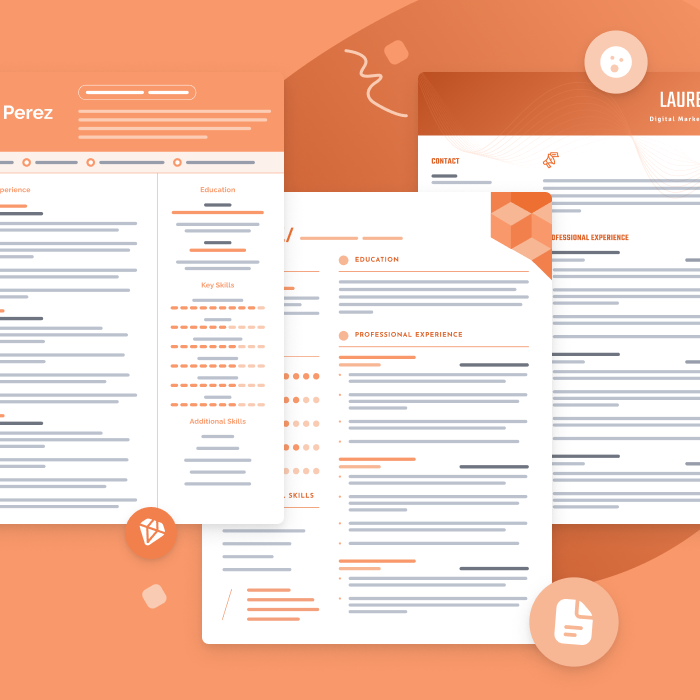
The best resume templates for 2024
One of the best ways to make your resume is by filling out one of our free resume templates. All our templates are designed by experts and free to download for Microsoft Word or Google Docs.
How to describe relevant work experience on a resume
Unsure how to present your relevant experience effectively?
Follow these three steps to highlight specific roles and prove to a prospective employer why you’d be a valuable addition to their team:
1. Compare the job description to your current qualifications
First, review the job description for your target role. Read through the requirements and highlight any skills, education, or key duties the company is looking for in a candidate.
Then, reflect on your previous roles and search for any similarities between the job description and your experience or abilities.
Alternatively, an online resume maker can help you find the relevant experience you should list on your resume. Most resume maker software will suggest relevant skills and experience for your industry based on user data, making it easy to tailor your resume for the job.
2. Be aware of specific keywords
Having relevant experience often means modifying your resume’s specific phrases and keywords to fit what a company is looking for.
Modern companies use applicant tracking software (ATS) to filter applicants’ resumes by scanning for matching keywords from the company’s job criteria. So write an ATS friendly resume by adding the exact keywords from the job description.
For instance, if a company requires “customer care” and “active empathy” for a receptionist role, include those two keywords and follow the exact wording as much as possible when writing your resume.
Here’s an example of a Starbucks Store Manager job description with highlighted keywords and phrases:
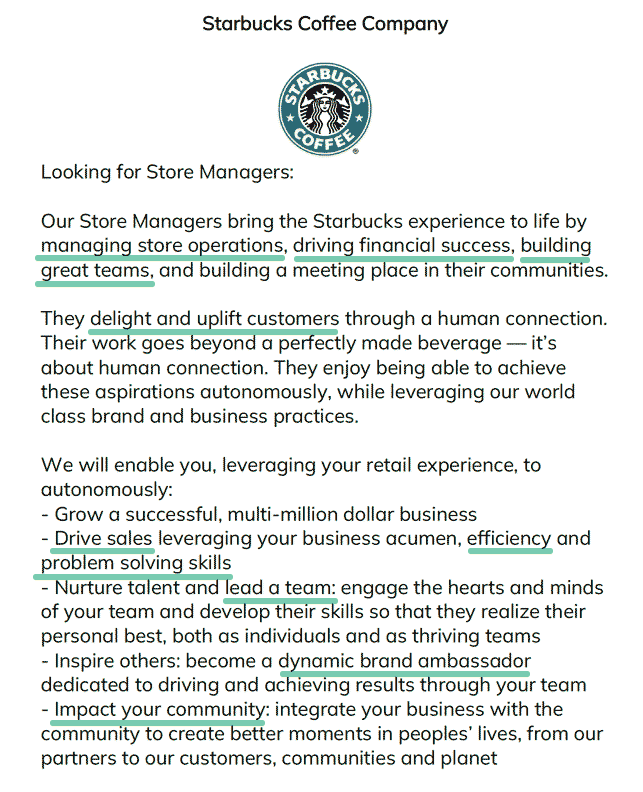
3. Modify your work experience section and skills section to reflect the job ad in your resume
After you’ve gathered enough information, tailor your professional experiences and skills section on your resume by removing any irrelevant positions or skills that don’t add value to your target role.
Then, think of ways to reword or modify your skills, achievements, and work experience resume bullet points to fit the job description’s requirements.
Irrelevant skills or examples take up valuable space on your resume, so avoid mentioning skills or experiences that don’t relate back to the job position.
Here’s an example of an applicant’s resume skills for the Starbucks Store Manager role without any relevant experience:
Irrelevant experience example on a skills section
- Reading skills
- Working independently
- Working with spreadsheets and complex data
- Negotiation
- Copywriting
- Working with legal documents
- Meeting strict deadlines
Here’s our applicant’s modified skills list for the Starbucks Store Manager position after using optimized keywords and aligning their relevant experience with the role:
Relevant experience example on a skills section
- Customer service skills
- Point of sales (POS) experience
- Managing store operations
- Interviewing, training, and building teams of 10–20
- Problem solving skills and conflict resolution
- Excellent financial analysis skills and ability to drive sales
And if you want to put more emphasis on your previous positions, try naming your work experience section “Relevant Experience” and placing your most related and recent work experience at the top of your resume.
Here’s how our applicant’s relevant experience is shown in the work experience bullet points of their Starbucks resume:
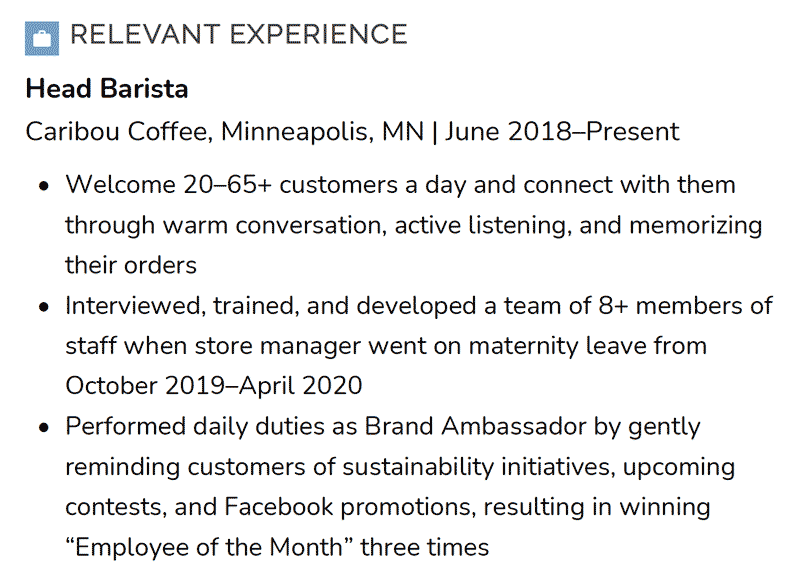
How many years of relevant work experience should I include on my resume?
The years of relevant experience you should include on your resume depends on the job description, experience level, and industry of the role you’re applying for. So read each job’s criteria carefully to learn how much relevant experience a company requires for a position.
Generally, 1–3 years of relevant experience is helpful for entry-level or junior positions, and 3–5 years is suitable for more experienced professions.
Also, remember that mid-level or senior positions may require more than five years of relevant experience.
Some companies may be willing to overlook your lack of experience if you have several soft skills, such as being self-motivated and adapting quickly to change. So when in doubt, apply for the position anyway and address your soft skills in your resume and cover letter.
What if I don’t have any relevant experience?
If you don’t have any relevant experience, ensure you’ve included all the necessary sections on your resume:
- resume header
- resume objective
- education section
- work experience section
- skills section
- additional sections (e.g., language skills, projects, publications)
And even if your target role is in a new or unfamiliar industry, you can modify these sections to fit the position you want. Chances are you’ll have some transferable skills or experiences that employers value in their applicants.
If you’re struggling to find relevant experience, try taking some online courses, talking to a mentor, or shadowing someone in the field you’re interested in pursuing.
Click to rate this article
4.2 Average rating


